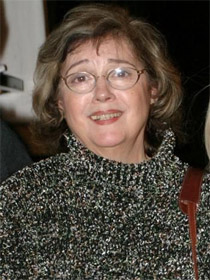
Božidara Turzonovová supported the construction of the blob in Letná
 |
"I believe that Prague should send this signal to the world. I can't explain exactly why, but I feel that the blob should stand in Letná, and I am ready to help this idea in any way," Turzonovová told ČTK.
The charming actress introduced herself today as a guest of Prague's Febiofest, where she reminisced about the filming of the sci-fi story by Otakar Fuky titled Akce Bororo, in which she played a Martian in 1972. She informed journalists that only after some time did she realize that one of the scenes was filmed in the villa of the Kaplický family.
"The lady of the house showed me a photograph of her son who emigrated to England, and it was only many years later that I recognized Jan Kaplický in it," the actress said. According to her, an old film presented at Febiofest thus uniquely connected with the contemporary controversial building.
Turzonovová's acting this year, at sixty-seven, is represented at Febiofest not only by Akce Bororo from 1972 but also by the five years younger historical drama about the love of Jan Neruda and Karolina Světlá, Příběh lásky a cti, directed by Otakar Vávra, in which she was co-starring with Jiří Bartoška, as well as the drama Penelopa by Štefan Uher from 1977. The selection also includes Božská Ema by director Jiří Krejčík. This impressive drama with a patriotic subtext highly exceeded the dullness of normalization productions in 1979.
Turzonovová's success on the big screen began in 1971 with the leading female role in the audience-favorite Boccaccian Krejčík's comedy Hry lásky šálivé. Over the next ten years, she also appeared in Václav Vorlíček’s comedy trilogy Bouřlivé víno, Zralé víno, and Mladé víno, as well as in Václav Matějka's retro comedies Anděl s ďáblem v těle, Anděl svádí ďábla, and Anděl se vrací. In 1977, 1979, and 1984, she was voted as the best actress by the readers of Film a doba magazine.
Turzonovová, whose home stage is still the Slovak National Theater in Bratislava, became the first dean of the Faculty of Dramatic Arts in Banská Bystrica and now leads an interpretive seminar at the Faculty of Mass Media in Bratislava. However, she believes that acting cannot be learned. "I can try to pass on some experiences, but the talent for acting is non-transferable," she noted.
The post-revolution years primarily brought her roles in television films and series. She also appeared in Svěrák's Vratné lahve, which was successful among audiences in Slovakia as well. "My role in it is just small, essentially consisting of cultivating my colleague Landovský. I didn't receive any marriage proposals or further roles after this film," laughs the actress, who claims to try to play every role as if it were her life's role. "And it doesn't matter whether the role was written by Shakespeare or some unknown author," she added.
The English translation is powered by AI tool. Switch to Czech to view the original text source.
3 comments
add comment
Subject
Author
Date
trochu offtopic, ne?
David Teplý
30.03.09 03:57
ad David Teplý - taky nechápu, i když...
30.03.09 04:45
A zde se kruh uzavírá:
takyarchitekt
31.03.09 08:49
show all comments










